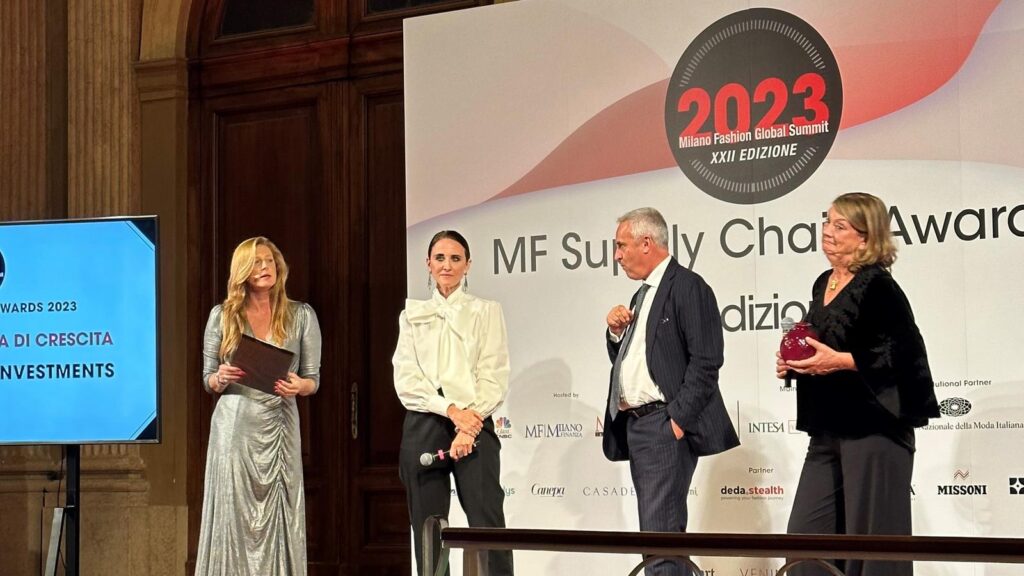
The quality of the Italian supply chain is essential for generating added value in the fashion and luxury industries. To this end, MF Fashion and Leanus joined forces to produce MFF SC20, the first-ever ranking of the fashion supply chain. The list includes the top 20 companies based in Italy that work in partnership with leading international fashion brands. The financial statements for fiscal year 2022 indicate significant turnover and revenue growth compared to the previous year. Despite the effects of the Covid-19 pandemic and production shutdowns in 2021, the selected companies were able to recover and surpass previous levels. The ranking criteria are initially associated with the nature of the business, utilizing Ateco codes for fashion and accessory industries, and subsequently with independence from brands. This excludes companies that are mostly under the control of luxury holding firms that have recently raised investment in their supply chain to secure strategic suppliers, providing them with operational and financial assistance.
After becoming part of a cluster revolving around one central entity, these customer-controlled companies were removed from the ranking. This leaves only independent companies and those that have received investment from outside the fashion system, including private equity firms. In fiscal year 2022, these 20 companies collectively generated over 3.1 billion euros in revenue, reflecting a year-on-year increase of almost 22.7%. This data confirms that the fashion supply chain experienced remarkable growth during the second post-pandemic year, despite some entities expressing unsatisfactory profitability. Unfortunately, due to certain negative values in both years, a comparison between ebitda 2022 and ebitda 2021 is not feasible. In five instances, within the top 10, the marginality result has decreased despite an increase in turnover. This highlights an operational difficulty that is directly caused by inflationary dynamics experienced by supply chain companies, partly due to the costs of raw materials and primarily to energy costs.
In 2022, supply chain players were unable to pass on the increased costs downstream in their supply chain, resulting in lower ebitda and ultimately affecting their balance sheet profits. Another area of concern is the current year’s results, as the revenue slowdown seen in luxury company balance sheets had already been felt upstream in the supply chain as early as the second quarter. Therefore, when we will check the status of the top 20 related to the 2023 fiscal year a year from now, the outcomes will be notably inferior. The sample comprises not only major companies producing materials, such as fabrics, leathers, accessories, and components, for various fashion markets, including clothing, footwear, leather goods, and more, but also luxury subcontractors who contribute greatly to the development and production of clothing and accessories collections for premium brands, yet are often not credited for their significant role and value. Premium brands often strengthen their ties with the supply chain and may even acquire strategic suppliers, in part or in full, to ensure the highest quality offerings from the market.
A topic close to the heart of Confindustria moda’s president, Ercole Botto Poala, is the supply chain. He highlighted the importance of diversity as a source of strength for Made in Italy. Among the 60,000 fashion companies represented by the federation, big brands are present that operate under their own names. However, the supply chain component’s weight is increasing significantly. This component includes textile companies, tanneries, manufacturers of haute couture garments, unique shoes and bags, as well as various materials’ outerwear, underwear, and jewelry that doubles up as accessories in fashion creations. «The pandemic has revealed that the demand for Italian products is unwavering, particularly those that embody the beauty and quality that distinguish creations made in Italy», the leader of Confindustria moda noted, who stressed the importance of supporting companies that operate with their own brand and nurturing the creativity present in Italian fashion districts while also highlighting the strong synergies between brands and suppliers. They aim to continue dominating the market in commercial terms. «Made in Italy should not only be seen as a result of cooperation between luxury holding companies and manufacturers. Italy has a varied network of companies with the ability to create top-notch, innovative, and eco-friendly products, thanks to our renowned creativity. Italian trade fairs serve as the primary platform for showcasing the outcome of these collaborative efforts worldwide. Without proper consideration and the implementation of supporting systems for our trade fair sector, we jeopardize the fertile ground on which it thrives. This outcome would be detrimental to not only ourselves but international luxury brands whose success is built on Made in Italy», he concluded.
Going into the top 20 rankings, Gruppo Mastrotto, a multinational company in the leather sector, takes first place with 298 million in revenue and over 30 million in ebitda. Second place goes to Finproject, a footwear sole Group that saw a 140% increase in annual results, surpassing 272 million. Rino Mastrotto group, another leather industry player, takes third place with 269 million. Several textile producers are in the top positions of the ranking, such as Carvico, Vitale Barberis Canonico, Cariaggi, and Limonta. Other tanneries such as Faeda, Cristina, and Bonaudo are also present. Additionally, footwear manufacturing partners are present, with the Lecce-based Leo shoes standing out as a reference point for brands designing Italian-made sneakers. Top-end leather shops, such as Fontana in Milan, Guerriero in Naples, and Palladio in Vicenza, specialize in the production. Clothing and knitwear companies, along with other garment makers, attach a Made in Italy label to their products, which then become part of designer collections sold in boutiques worldwide. This sample excludes supplier companies where luxury customers have taken a majority stake and manufacturers mainly operating under their own brands. In the following boxes, the emphasis is on the top two companies in the ranked list of 20, Gruppo Mastrotto and Finproject, as well as the most profitable company, Vibram.
Gruppo Mastrotto is the top revenue earner
The leather company sits atop the list with 298 million in revenue, and has plants in Brazil, Indonesia, Tunisia and Mexico. Though Gruppo Mastrotto has a global presence, their center of operations is in Italy, where they were founded in 1958 by Arciso Mastrotto. The company has grown under the management of his sons Bruno and Santo Mastrotto and is now chaired and administered by Chiara Mastrotto. Up to ten of the company’s production units are located in the tanning district of Arzignano, with an additional facility in the Tuscan cluster in Santa Croce sull’Arno. «Our path has a strong foundation», president and ceo Chiara Mastrotto stated to MFF. «We are commemorating our 65th anniversary this year, and we have consistently valued diversification, which is a defining characteristic of our company». Gruppo Mastrotto manufactures leathers for customers in the fashion, automotive, design, marine, and aviation industries. The company exports to over 110 countries and provides made-to-order leather with its Gruppo Mastrotto express service. This service offers a variety of over 1,500 ready-to-stock colors.
Italy accounts for approximately 40% of the fashion market, a figure expected to increase both in volume and as a segment. The Group anticipated significant growth in luxury goods, with a focus on leather goods that draws strength from the Italian-French axis. «The center of the creative development of Italian haute couture is highly stimulating and creates strong supply chain connections», the ceo added. The future poses numerous challenges: to remain a global partner while also maintaining a strong local presence for our customers, to invest in human resources and R&D, to continue the commitment to environmental and social sustainability. «Our dedication to recovering and recycling production waste is very important. Our newest patent involves Reviva, produced from leather trimmings that were previously discarded, which has now become a new material to make shoes, bags, and furnishings». Gruppo Mastrotto’s future plans do not include the possibility of outside shareholders acquiring majority stakes. «We firmly believe that our family’s long-standing leadership, complemented by competent managers, reflects a strong foundation built on a long-term entrepreneurial vision. This governance has enabled us to overcome challenges and achieve impressive results over the past 65 years. It is the cornerstone upon which we will continue to build the future of our organization», Chiara Mastrotto concluded.
Finproject, a top performer with a growth of over 140%
With 279.5 million in revenue, which increases to 325.9 million at the consolidated level, Finproject not only ranks second in the «Made-in-Italy» supply chain, but also emerges as the top performer in 2022, thanks to a 140% increase achieved in the first full year of the union of forces with Versalis, the Italian chemical leader belonging to the Eni group. The Marche-based company, specializing in producing soles for footwear, sold its shares to Versalis in 2021 to strengthen its market position in high value-added materials and solutions. This operation created synergy between the technologies and professional skills of the two companies. «We aim to develop highly innovative products that promote sustainability and circularity, providing solutions that modernize strategic sectors including wire and cable, footwear, automotive, design, fashion, and other emerging industries», Maurizio Vecchiola, Finproject’s president and ceo, stated. Fashion and luxury make up approximately 43% of the total business. However, their importance goes beyond this. «The constant quest for innovation in the pursuit of high-performance materials, with attractive aesthetic features and an emphasis on sustainable production, is driven significantly by the fashion and luxury sector’s relentless pursuit of what is new and beautiful», Vecchiola highlighted.
A crucial step in building relationships with these Groups was the 1994 launch of XL extralight, an innovative product that aimed to provide lightweight and high-performance footwear to millions of people worldwide. Despite the assurance from Vecchiola, at the time, the market was not yet prepared. «Back then, the industry was biased and believed that beauty and fashion contradicted the concepts of performance and comfort. Looking back 25 years later, we can confidently say that we were correct». Finproject’s mission is to introduce technologies and materials that enable creativity to transcend physical and technical limitations, «which have long held the industry back in a struggle between aesthetics and performance», according to the ceo. The company has a strong foothold in the Italian market, accounting for approximately 26% of the sector. «Italy maintains its position as a top producer of luxury and high-end goods. The reshoring and supply chain redefinition dynamics also create noteworthy opportunities from which the industry is already benefiting».
Vibram is a top performer with a record ebitda of 21.3%
As the Italian leader in generating margins among supply chain players, Vibram has achieved over 21% ebitda on sales. Through transforming the previously overlooked shoe sole into a flagship brand, the Albizzate-based company in Varese, the company has successfully demonstrated its innovative prowess. In recent years, there has been a blending of the outdoor and lifestyle worlds, creating a genuine outdoor-in-the-city style. Vibram has taken advantage of this trend by accelerating its business in the fashion and luxury industry, which currently makes up roughly 15% of its overall business and has been steadily growing in recent years. This shift has necessitated changes in the approach towards fashion in the outdoor and industrial segments. It involves an ongoing process of collaboration that considers partner demands while also prioritizing the intrinsic nature of materials, manufacturing processes, and product quality, which are crucial to Vibram.
A key feature for fashion and luxury brands is aesthetics, which always pairs with the concept of performance. Italy accounts for approximately 10% of the fashion industry’s business with promising potential, albeit the backdrop of significant investment. Nonetheless, production of certain types of items in Italy cannot compete with costs in China. However, Vibram is committed to maintaining a balance between local and overseas production, prioritizing proximity to customer factories in local for local production when possible. Future goals include confirming leadership in high-performance soles, expanding internationally, and maintaining high quality standards to meet customer needs. The product focus is on Vibram SoleSystem, a revolutionary complete sole concept aimed at enhancing product performance and potential in a single solution. This development is linked to entering new market segments, including the indoor world. For example, the design of a very technical and high-quality sole for the Bullpadel brand is intended to create the perfect shoes for padel enthusiasts. There will also be developments regarding sustainability, specifically in terms of more responsible procedures and products. (All rights reserved)







